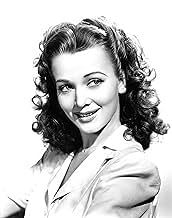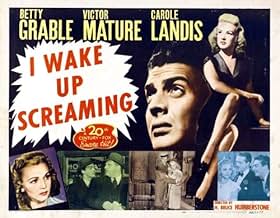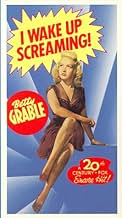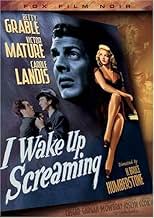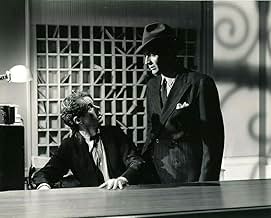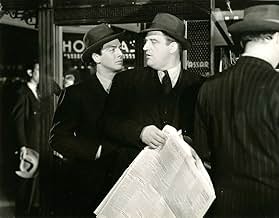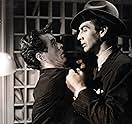IMDb-BEWERTUNG
7,2/10
5693
IHRE BEWERTUNG
Warum versucht Inspektor Ed Cornell, Frankie Christopher den Mord an dem Model Vicky Lynn anzuhängen?Warum versucht Inspektor Ed Cornell, Frankie Christopher den Mord an dem Model Vicky Lynn anzuhängen?Warum versucht Inspektor Ed Cornell, Frankie Christopher den Mord an dem Model Vicky Lynn anzuhängen?
- Regie
- Drehbuch
- Hauptbesetzung
- Auszeichnungen
- 2 wins total
May Beatty
- Lady Handel
- (as Mae Beatty)
Brooks Benedict
- Nightclub Patron
- (Nicht genannt)
Edward Biby
- Nightclub Patron
- (Nicht genannt)
Stanley Blystone
- Police Detective
- (Nicht genannt)
Empfohlene Bewertungen
A pretty waitress is given a shot at the big time by a handsome sports impresario. She grabs her chance with alacrity, but Fate has plotted a different course for her ...
Bruce Humberstone directs this attractive early noir with a strong sense of visual style. His Director of Photography, Edward Cronjager, works wonders with elongated shadows and labyrinths of lattice.
Victor Mature looks good as Frankie Christopher, the romantic lead. Always a fairly limited actor, he never the less captures his character's ambivalence sufficiently well for the viewer to be kept wondering about him until the final reel. But for all Mature's efforts, Frankie remains a lightweight. He spends more time onscreen than anyone else, but remains in the viewer's memory less successfully than the other three leads.
After almost a decade in films, Betty Grable was 25 years old in 1941 and already an established star when she took on the role of Jill Lynne. Her character has psychological depth, and Grable does justice to the part. Jill is the slightly staid older sister of Vicky the glamour girl. While Vicky gives free rein to her every whim, Jill suppresses her id, but her yearnings are simmering just below the surface.
Of course, those legendary Grable legs have to be put on display, and we get three glimpses of Hollywood's most-insured thighs - first when the two sisters flounce around in robes, discussing the letter, then when Jill accompanies Frankie to the Lido Plunge, and finally when she is tottering up firescapes and over rooftops in her high heels.
Inspector Ed Cornell is a figure of stature, apparently a good guy, but one who fills the viewer with a sense of uneasy foreboding. Laird Cregar captures brilliantly the bleakness and creepiness of Cornell, the cop who starts the movie as a silent shadow, but who grows inexorably to dominate the proceedings. The moment when Jill meets Cornell for the first time is a very dramatic one, just as Vicky's first encounter with the eerie detective was disturbing. Robin Ray (Alan Mowbray) breaks down under interrogation, and Cornell's stillness as the suspect sobs is rather unsettling. "You're not a cop looking for a murderer," Cornell is told, and we become increasingly aware that this repressed man is conducting some kind of unhealthy personal crusade. It is only at the very end of the film that Cornell displays any emotion, and then the floodgates open.
Carole Landis, the ill-starred actress who plays Vicky Lynne, deserves a special mention. Like her character, whose fictional tragedy she paralleled in her own life, Landis was a victim of her own beauty. A tough but brittle radiance, total self-absorption and an impatience with the trappings of success ("I've got about as much privacy as a lingerie mannequin!") are Vicky's salient attributes, but could be said to apply to Landis herself. She gives a confident performance and sings beautifully. Like Vicky, she shot to instant fame but never found love, and died in her 20's. Thus does Life imitate Art.
The film contains some errors and improbabilities, but these do not seriously detract from the viewer's enjoyment. Cornell gathers evidence (such as discarded cigarette butts) with blatant disregard for preservation and continuity. That Harry should pack Jill's things, ready for her to move out, is just plain weird. The Assistant DA (played by Morris Ankrum) rides Cornell far too hard, given the detective's peerless reputation - and would the lawyer have direct operational command over a detective anyway? Frankie is allowed to compound felonies, and threaten cops, with impunity. Unbelievably, the police grant him the freedom to crack the case, even though he is the main suspect.
Music is used effectively throughout. "Somewhere Over The Rainbow" (the hit from the recent 'Wizard Of Oz') is Frankie and Jill's love theme. Vicky's signature tune is a wonderfully decadent jazz melody, brassily scored. Plot points are nicely underlined by discords in the incidental music, and during Cornell's final speech, Vicky's theme is reprised with great poignance and beauty on a muted trumpet.
We do not normally associate film noir with humour, but this one uses jokes well, both to punctuate the plot and to add a little light to the shade. Watch for gentle little gags involving latch keys, a Tootsie Roll, the girl at the Lido Plunge and a fold-away bed.
"You've got a heart made out of rock candy," Vicky is told, and in life the hard young woman is an unsympathetic character. Death transforms her, and she haunts the remainder of the film like a sort of ghost, her photograph adorning walls and bedside tables, more appealing in reverie than she ever was in the flesh. There is no help for it, Vicky is gone for ever. The question is whether those who loved her can continue to live without hope. "It can be done," intones the nihilistic Cornell.
Just for the record, though two characters are startled out of sleep by bedroom intruders, nobody in "I Wake Up Screaming" wakes up screaming.
Bruce Humberstone directs this attractive early noir with a strong sense of visual style. His Director of Photography, Edward Cronjager, works wonders with elongated shadows and labyrinths of lattice.
Victor Mature looks good as Frankie Christopher, the romantic lead. Always a fairly limited actor, he never the less captures his character's ambivalence sufficiently well for the viewer to be kept wondering about him until the final reel. But for all Mature's efforts, Frankie remains a lightweight. He spends more time onscreen than anyone else, but remains in the viewer's memory less successfully than the other three leads.
After almost a decade in films, Betty Grable was 25 years old in 1941 and already an established star when she took on the role of Jill Lynne. Her character has psychological depth, and Grable does justice to the part. Jill is the slightly staid older sister of Vicky the glamour girl. While Vicky gives free rein to her every whim, Jill suppresses her id, but her yearnings are simmering just below the surface.
Of course, those legendary Grable legs have to be put on display, and we get three glimpses of Hollywood's most-insured thighs - first when the two sisters flounce around in robes, discussing the letter, then when Jill accompanies Frankie to the Lido Plunge, and finally when she is tottering up firescapes and over rooftops in her high heels.
Inspector Ed Cornell is a figure of stature, apparently a good guy, but one who fills the viewer with a sense of uneasy foreboding. Laird Cregar captures brilliantly the bleakness and creepiness of Cornell, the cop who starts the movie as a silent shadow, but who grows inexorably to dominate the proceedings. The moment when Jill meets Cornell for the first time is a very dramatic one, just as Vicky's first encounter with the eerie detective was disturbing. Robin Ray (Alan Mowbray) breaks down under interrogation, and Cornell's stillness as the suspect sobs is rather unsettling. "You're not a cop looking for a murderer," Cornell is told, and we become increasingly aware that this repressed man is conducting some kind of unhealthy personal crusade. It is only at the very end of the film that Cornell displays any emotion, and then the floodgates open.
Carole Landis, the ill-starred actress who plays Vicky Lynne, deserves a special mention. Like her character, whose fictional tragedy she paralleled in her own life, Landis was a victim of her own beauty. A tough but brittle radiance, total self-absorption and an impatience with the trappings of success ("I've got about as much privacy as a lingerie mannequin!") are Vicky's salient attributes, but could be said to apply to Landis herself. She gives a confident performance and sings beautifully. Like Vicky, she shot to instant fame but never found love, and died in her 20's. Thus does Life imitate Art.
The film contains some errors and improbabilities, but these do not seriously detract from the viewer's enjoyment. Cornell gathers evidence (such as discarded cigarette butts) with blatant disregard for preservation and continuity. That Harry should pack Jill's things, ready for her to move out, is just plain weird. The Assistant DA (played by Morris Ankrum) rides Cornell far too hard, given the detective's peerless reputation - and would the lawyer have direct operational command over a detective anyway? Frankie is allowed to compound felonies, and threaten cops, with impunity. Unbelievably, the police grant him the freedom to crack the case, even though he is the main suspect.
Music is used effectively throughout. "Somewhere Over The Rainbow" (the hit from the recent 'Wizard Of Oz') is Frankie and Jill's love theme. Vicky's signature tune is a wonderfully decadent jazz melody, brassily scored. Plot points are nicely underlined by discords in the incidental music, and during Cornell's final speech, Vicky's theme is reprised with great poignance and beauty on a muted trumpet.
We do not normally associate film noir with humour, but this one uses jokes well, both to punctuate the plot and to add a little light to the shade. Watch for gentle little gags involving latch keys, a Tootsie Roll, the girl at the Lido Plunge and a fold-away bed.
"You've got a heart made out of rock candy," Vicky is told, and in life the hard young woman is an unsympathetic character. Death transforms her, and she haunts the remainder of the film like a sort of ghost, her photograph adorning walls and bedside tables, more appealing in reverie than she ever was in the flesh. There is no help for it, Vicky is gone for ever. The question is whether those who loved her can continue to live without hope. "It can be done," intones the nihilistic Cornell.
Just for the record, though two characters are startled out of sleep by bedroom intruders, nobody in "I Wake Up Screaming" wakes up screaming.
There's a lot to like about this Film Noir: excellent use of shadows (some spectacular patterns), Victor Mature's best acting role, Carole Landis' (who's both a better actress & prettier than Betty Grable) juicy part, Laird Cregar in one of the best scary roles of his too short career, & a strong plot. For cheesecake fans: yes, you do get to see Betty's great legs in a swimming pool scene that seems to have been incorporated into this film for just that purpose. For beefcake fans: yes, you do get to see Victor's chest in the same swimming pool scene. So everyone should have something to be happy about. There's lots of suspects here (five solid ones) to choose from, & I got it wrong, so the film gets an extra point for that. I rate it 9/10.
I Wake Up Screaming is an odd and oddly satisfying film. It is in the noir mold but it's a little earlier than most. The studio that made it was not noted for making thrillers, and the stars,--Victor Mature, Betty Grable and Carole Landis--were not the types one would expect to find in this sort of dark movie. Yet it is fun from the start to finish, and at times creepy, thanks mostly to the presence of Laird Cregar as a cop determined to nail Mature for the murder of a heartless showgirl that he, Cregar, was himself infatuated with. The studio New York of the film is much less intimidating than one might expect in a mystery, and overall the tone is bright and bouncy,--call it noir light. But it's Mr. Cregar who makes the film work. He dominates the picture as soon as he enters it with an authority and sense of himself that most actors would kill for. Cregar was, in short, a genius. The supporting cast, which includes Allyn Joslyn and Alan Mowbray, make the best of their lines, which are often quite witty, and the script is, overall, far better than average.
Being a fan of old movies, I must say that Cregar's performance in this film interested me a great deal. Having only been in his mid 20's at production, he is able to come off as a man who has indeed been on the force for some years. I've enjoyed his work in other movies, and wonder while watching his work what might have been had he lived beyond the young age of 28.
When the model Vicky Lynn (Carole Landis) is found murdered in her apartment in New York, the promoter of sports Frankie Christopher (Victor Mature) becomes the prime suspect of Inspector Ed Cornell (Laird Cregar) and is brought to the precinct for interrogatory. Christopher discloses how he promoted the career of Vicky when she was a waitress after making a bet with his friends Robin Ray (Alan Mowbray) and Larry Evans (Allyn Joslyn). After reaching the stardom, Vicky tells Christopher that she would leave him to go to Hollywood and on the next day, she was killed. Ed Cornell insists that Christopher is the killer and frames him, and Christopher can only have the support of Vicky's sister, Jill Lynn (Betty Grable), who has fallen in love with him. Who Killed Vicki?
"I Wake Up Screaming" is a film-noir with a story of unrequited love and obsession and "Over the Rainbow" as the music theme (after "The Wizard of Oz" of two years before). Laird Cregar is scary in the role of Inspector Ed Cornell and the final twist surprises and is well resolved. My vote is seven.
Title (Brazil): "Quem Matou Vicki?" ("Who Killed Vicki")
"I Wake Up Screaming" is a film-noir with a story of unrequited love and obsession and "Over the Rainbow" as the music theme (after "The Wizard of Oz" of two years before). Laird Cregar is scary in the role of Inspector Ed Cornell and the final twist surprises and is well resolved. My vote is seven.
Title (Brazil): "Quem Matou Vicki?" ("Who Killed Vicki")
Wusstest du schon
- WissenswertesThe writers used the name "Cornell" for the obsessive cop played by Laird Cregar, a tribute to noir writer Cornell Woolrich.
- PatzerJill's new address is apartment F, but when Cornell visits, the door is clearly marked 3B.
- Zitate
Ed Cornell: I'll follow you into your grave. I'll write my name on your tombstone.
- Crazy CreditsOn BBC Two UK broadcasts, the 20th Century Fox logo does not appear at the beginning; instead there's an opening credit saying "Twentieth Century-Fox Presents".
- VerbindungenEdited into I Wake Up Screaming: Deleted Scene (2006)
- SoundtracksStreet Scene
(uncredited)
Music by Alfred Newman
[Played over main titles, then heard as background music throughout the movie]
Top-Auswahl
Melde dich zum Bewerten an und greife auf die Watchlist für personalisierte Empfehlungen zu.
- How long is I Wake Up Screaming?Powered by Alexa
Details
Box Office
- Budget
- 462.000 $ (geschätzt)
- Laufzeit1 Stunde 22 Minuten
- Farbe
- Seitenverhältnis
- 1.37 : 1
Zu dieser Seite beitragen
Bearbeitung vorschlagen oder fehlenden Inhalt hinzufügen

Oberste Lücke
By what name was I Wake Up Screaming (1941) officially released in India in English?
Antwort

